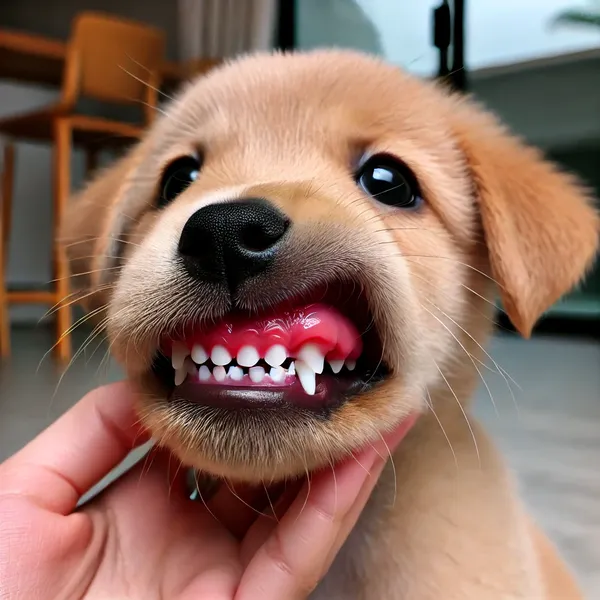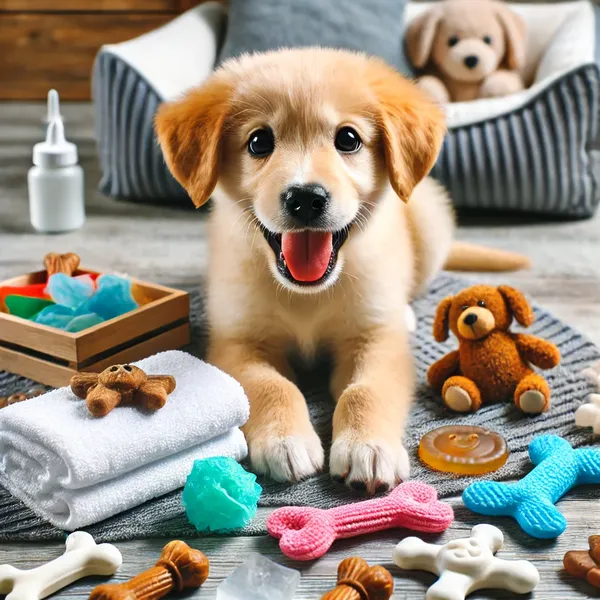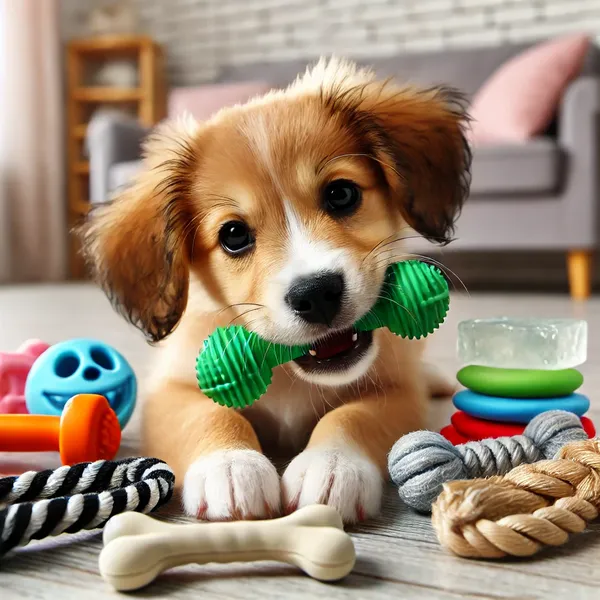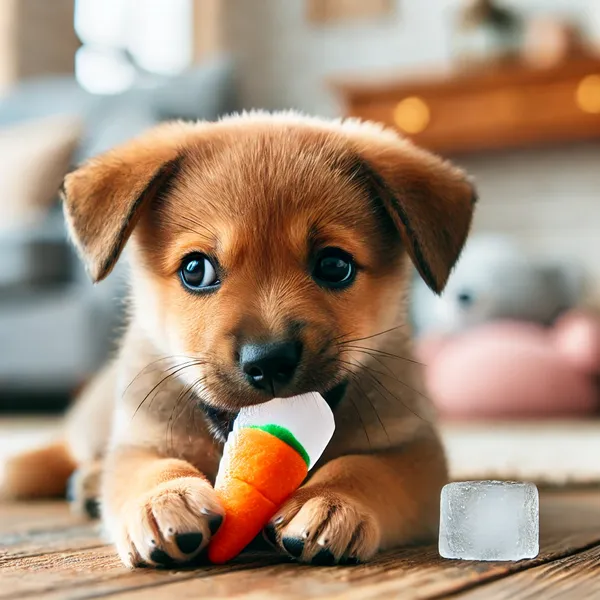What to do when your puppy is teething? Puppies are tactically curious and playful little furballs. However, in a teething puppy’s case, things can get overwhelming.
Teething itself is a very expected biological phase whereby the decayed teeth of the puppy are shed to give room for the adult teeth. This also comes with pain, irritation, and the annoying biting of everything within reach.
So, how exactly do you tend to your puppy and keep your household and furniture intact in these circumstances?
This article will also examine the challenges associated with puppy teething solutions and why offering relief to a teething puppy is essential.
What Is Puppy Teething?

Puppies’ teething is similar to that of children. Puppies tend to have 28 primary teeth, which typically start working at the age of about 3 to 4 months and begin the shedding process. By six to eight months of age, the puppy has full-grown adult teeth, also known as a dentition of 42 teeth.
Symptoms Showing that have a teething puppy:
- Every Undesirable Object In The Reaches Of The Puppy Is Being Chewed – A vivid example is a gum-itching puppy. The more they ache, the more the puppies chew to ease their gums.
- Swelling and redness of the gums – Your pup’s teeth usually appear like raised lumps due to the overgrown gums and edentulous arches.
- Excessive Salivation – One of the side effects of teething is that it makes one drool more than usual.
Keep Your Belongings Safe

When pets have teeth grow, they tend to bite anything from shoes and furniture to bloody wires! To save your house and the puppy, here are a few preventive measures you can take…
1. Ensure your home is suitable for pups
Puppy-proofing, just like baby-proofing, is essential, especially for people with puppies. Remove anything that can be damaging or valuable. Look at it this way: if it is not worth the puppy’s teeth, then it should be kept away.
2. Try using the bitter sprayers
Bitter sprays are puppies’ anti-chewing products to chew while not on the understood cleaning products. They breed disdain onto which even some surfaces and puppies can stand. Simply spray them on the sections the puppy is fond of chewing; eventually, it will steer clear of them.
3. Keep Them Busy
A dog that has achieved boredom is sure to be more mischievous. Therefore, don’t worry; give that puppy all the attention it needs and all the toys.
Playing on a regular basis, doing a few minutes of practice every so often, and engaging them in puzzle toys will be very helpful in helping the little man’s mind focus away from the chair that you cherish so much.
Comforting Your Puppy
Puppies undergo teething pains; sometimes, they just want some TLC. Keeping this in mind, calming and soothing your puppy will be useful during this period.
1. Gums Rubbing
Sore muscles can be attended to by rubbing them. In this case, it is also possible to soothe the pain of your puppy’s gums by gently rubbing them. It is always advisable to use a clean finger or a puppy’s toothbrush to brush and rub the surface of the gums. Be careful not to cause any pain while doing this.
2. Cuddles and Reassurance
Teething is challenging for puppies; thus, your puppy could be slightly irritable. Most of the time, too much fussing inhibits them from playing. Pick up your puppy, comfort it, and tell it that everything is fine and that it is okay and all will be well.
3. Watch Out for Their General Condition
Teething is a developmental stage that all young puppies go through, but you still have to observe the well-being of your young pup. If the pup appears in extreme pain or discomfort or presents strange signs such as spitting blood or not eating or drinking, a visit to the animal doctor may be necessary.
Training During Teething

Training sessions with a teething puppy can be tricky; their attention is often split between the activity and their tender, toothless gums. However, regular training can also help direct your puppy’s behavior even during this period.
1. Redirect Their Chewing
If your puppy resolves to chew on something they shouldn’t, try urging them more calmly toward an object they can chew like a chew toy. It’s essential to be this way –With time, your puppy will understand what is appropriate to chew and what is not.
2. Use Positive Reinforcement
You must reward your puppy, especially when they chew the right items after or during teething or act appropriately during teething. Use food, compliments, and petting as tools to promote positive behavior. After all, who doesn’t love a reward? Puppies are the same!
3. Teach Bite Inhibition
The puppies in their teething stage can nip a little too much. Take advantage of this period to teach them bite inhibition, a critical aspect of puppy training. Yelping like a dog who has been bitten can also work – if the play becomes too rough and they fight over a toy or something and a puppy bites too hard. This is essential training for the puppy to learn not to use their mouth too rough.
Dealing with the Stress of Teething
Puppies may act a little off during the teething period. They may become cranky, sleep more than usual, or behave differently. That is fine, but ensuring that your puppy remains healthy and comfortable throughout the ordeal is imperative.
1. Make Sure Their Food is Soft
If your puppy exhibits exaggerated discomfort, you may wish to give them softer food. Giving pets with very sore mouths, such as puppies, moist or softened kibble will be more pleasant and more accessible for them to eat.
2. Allow Enough Time to Sleep
Erupting teeth can be an exhaustive affair, so your pup may require additional rest. Designate a quiet spot free from intrusion where they can lie down and sleep.
3. Understand
Every dog loves their teeth and enjoys chewing on things. However, this is also a stage that will pass. It all just takes time. Take it easy on your puppy and appreciate that that behavior is not who they are at that particular moment. They are simply trying to deal with pain in the only way they are capable of.
When Should a Vet Be Consulted?
In the majority of cases, teething is a normal phenomenon that does not require action or medical attention. However, there are instances when it is preferable to seek the services of a vet.
Situations Under which it is Advisable to Consult a Vet when a Puppy is Teething:
- Fractured Teeth: Please consider it problematic when you can see a broken tooth or damaged portion.
- Unusual Bleeding: Though a little gum bleed can be expected, an unusual or heavy bleed is worrisome.
- Disinterest in Food: Where a day passes without your puppy eating any food.
- Inflamed Face and Jaw: This might indicate infection.
Teenage puppies sometimes develop more teeth than their mouths can allow. Fortunately, your vet will assist in managing your puppy in this situation.
How to Help Your Puppy During Teething

1. Offer Teething Toys
We advise you to look for toys for children suffering from sore muscles that serve the purpose of chewing. Some of them have a surface that is usually quite rough to help ease the pain in their gums.
Teething Toys Examples:
- Rubber Toys: These are long-lasting and safe to chew on.
- Cooling Chew Toys: Some can be kept in the freezer for added effect.
- Rope Toys: Ideal for puppies that enjoy tugging and chewing on things.
You can make your own by freezing a wet washcloth for your puppy to chew on.
2. Give Frozen Treats

Toys that are edible and can be frozen in the mouth may sound weird, but they are definitely refreshing and soothing for a teething puppy. Just as people eat hot food and even go for ice cream, frozen snacks are enjoyed by this species for the gums.
Consider freezing:
- Ice Cubes: These are plain ice cubes and are a straightforward and safe pet treat.
- Frozen Carrots: These are crunchy and cold, hence perfect for chewing.
- Puppy Safe Frozen Broth: Take low-sodium broth, pour it into an ice tray, and freeze it for a frozen treat.
3. Utilize Safe Puppy Chews
Natural chews such as Bully sticks and the like can keep them entertained and relieve their boredom for a long time. Just be sure that they are puppy-safe and digestible.
Do not allow them to use any chews that are extremely hard, like bones, as they can break their young growing teeth.
Teething may be challenging for the puppy baby and the puppy owner, but adapted management can go a long way in reducing the effects of this stage. Provide the right types of chew toys, soot and soothe, and secure an environment during this period. Calm down and please the puppy as much as possible during this critical development phase.
Be sure that puppies grow very fast; soon, belly aches due to teething will be an experience, and nothing but all teeth intact and shiny will make a healthy puppy.
These techniques can prove compelling and safe for most puppies during this problematic teething period. Also, recognize that even though every puppy will undergo teething, the experience will be very different for each and your best furry friend. Teething is a stage that will pass, but the bond you will create with your puppy will be strong enough to surpass this period.